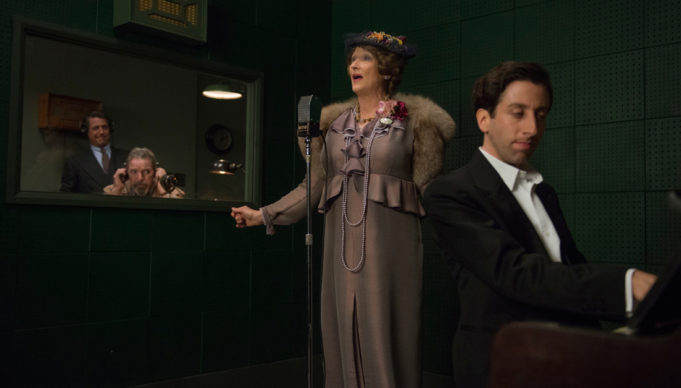Meryl Streep has proven her singing ability time and again, so it seems more than a bit perverse to cast her as one of the worst opera singers in recorded history, which is what Florence Foster Jenkins does. She plays the title character, a septuagenarian Pennsylvania socialite living in New York in 1944 with her British common-law husband St. Clair Bayfield (Hugh Grant). A former concert pianist, Florence now lives for the vocal performances she gives privately for the members of her social club, who are mostly too old to appreciate that Florence is a mezzo who thinks she’s a soprano and further has no sense of phrasing, rhythm, diction, key, or pitch. When she presses a record intended for private distribution, copies of the recording get out, leading to airtime on the city’s classical radio stations and eventually a sold-out concert at Carnegie Hall. The whole story is seen through the eyes — or rather, heard through the appalled ears — of Cosmé McMoon (Simon Helberg), the short-statured, soft-spoken pianist from San Antonio who’s hired to accompany Florence in her lessons and performances.
Director Stephen Frears hits some predictable comic notes with Streep veering wildly off pitch, breaking every rule of breath control, and indulging in flourishes that Florence probably thinks sound cool. Better stuff comes from the more subdued material that deals with Florence’s syphilis, contracted from an ill-advised early marriage and treated with the medications of the day, mercury and arsenic. There’s a nice little scene where Florence sits at the piano in Cosmé’s apartment, remembering her days as a pianist before the disease damaged her nerves, and the two wind up playing Chopin’s E minor Prelude together, with Cosmé playing the left-hand part that she can’t play anymore.
(Worth noting: Helberg is best known for playing Howard on TV’s The Big Bang Theory, but here he shows off some serious skills at the piano.)
The movie depicts Jenkins as kept innocent by St. Clair and a band of enablers who shield her from any notion that she’s not a great singer. The real-life Jenkins was fully aware that people were laughing at her during her concerts, but dismissed the detractors as troublemakers paid off by rival sopranos. Jenkins died two days after her Carnegie Hall concert, greatly distressed by the negative reviews that came when real classical music critics finally heard her. This movie is afraid of making too much fun of its subject for this and other reasons, and that unfortunately keeps the movie from joining that great tradition of films that pay tribute to the cracked nobility of making bad art that runs through This Is Spinal Tap and Ed Wood and Waiting for Guffman. This tradition could use a female entry, and Florence Foster Jenkins will have to suffice until something better comes along.
[box_info]Florence Foster Jenkins
Starring Meryl Streep and Hugh Grant. Directed by Stephen Frears. Written by Nicholas Martin. Rated PG-13.[/box_info]













I disagree with your review. I think the movie worked well as a focus on Florence’s life and not a focus on “bad art.” The only reason she got attention in real life was because she was rich. I think the movie captured the essence of the audiences that shielded her feelings for some entertainment (her audiences were heavily regulated in the beginning and the film supports this truth) and the audiences that came with Carnegie Hall- true critics that reported how awful she really was. If it were something like Spinal Tap, filmgoers would miss out on the character and personality of the real Florence.